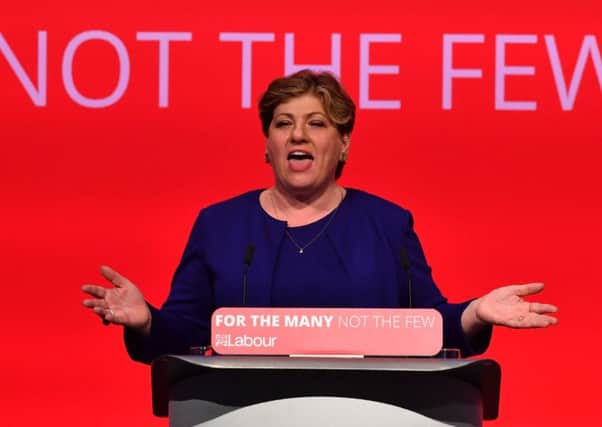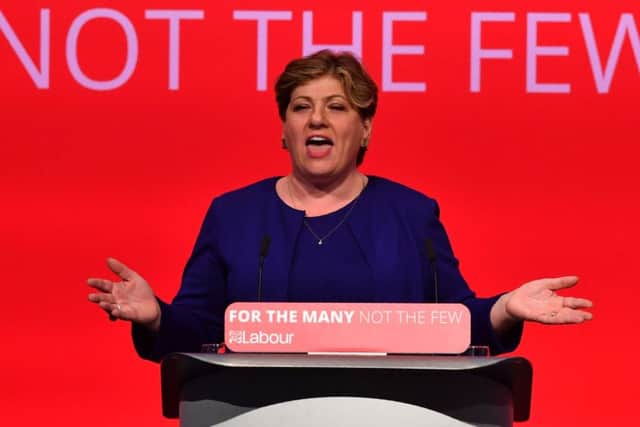Can Labour really wipe out the SNP in Scotland?


Scottish leadership candidate Anas Sarwar twice declared his tanks were parked on the lawn of Nicola Sturgeon - which drew a stinging riposte from the First Minister at Holyrood that he might as well cut the grass while he’s there.
Then one of Jeremy Corbyn’s closest allies, shadow foreign secretary Emily Thornberry, spoke of her intention to ‘wipe out’ Ms Sturgeon’s party at the next general election.
Advertisement
Hide AdAdvertisement
Hide AdLabour may be the third force in Scottish politics in terms of numbers of MPs and MSPs, but it is clear they view themselves as a movement on the up after their better-than-expected performance at June’s snap election.


Raw numbers
Going from one MP to seven in most circumstances would be an achievement.
Squeezed between the resurgent Scottish Conservatives and incumbent SNP candidates, Labour’s gains in Scotland were a surprise, but no less impressive for it.
But their vote north of the border increased by less than three per cent - not quite tanks-on-lawn.


In seats won by the Tories from the SNP, Labour found themselves slipping even further back.
Labour held Edinburgh South seat but in other constituencies in the capital, including those previously won in 2010, the party’s share of the vote fell.
Results in Scotland’s biggest city were more encouraging. Paul Sweeney won Glasgow North East with a majority of 242, planting the Labour flag back in a former heartland after the SNP wipeout of 2015.
One MP in the city could easily have been three. In Glasgow East, the Nationalist candidate David Linden held the seat previously occupied by Natalie McGarry by 75 votes. South of the Clyde, Chris Stephens held the Glasgow South West constiutency for Nicola Sturgeon’s party with a majority of just 60.
Advertisement
Hide AdAdvertisement
Hide AdMr Sweeney told The Scotsman that if June’s election campaign had lasted a week longer the party could have made further gains.
“I feel the party is still on an upward trajectory in the city,” he said. “If the campaign in Glasgow has lasted just 24 hours longer we could have picked up another three seats.”
The Corbyn effect
Those numbers weren’t lost on Mr Corybn’s supporters in Scotland.
Even at a relatively harmonious Labour conference in Brighton, MSP Neil Findlay, Corbyn’s closest Scottish ally, said the party should have spent less time ‘banging on’ about independence and more time embracing the ‘For the Many, not the Few’ agenda of the left-wing UK Labour leader.
The Campaign for Socialism made a similar comment in July in a blunt post-election analysis of former leader Kezia Dugdale, who abruptly resigned last month.
They accused the Labour campaign in Scotland of ‘tacitly allowing’ the surge in support for the Conservatives by endlessly discussing the prospect of IndyRef2.
With another referendum no longer on the agenda, Labour can now test the theory that more voters will respond to a left-wing message rather than a constitutional warning.
The future
Labour advisers may say every seat in Scotland is in play, but the party’s current, more modest target of gaining 23 seats is not only far more likely, but much more achievable.
Advertisement
Hide AdAdvertisement
Hide AdBut the SNP’s formiddable electoral machine cannot be written off - and if the party’s incumbents in Glasgow are worried, they aren’t showing it.
“It’s interesting to note that Labour are so focussed on winning SNP seats, so much so that they appear to have overlooked the twelve Tory seats in Scotland,” Glasgow East MP David Linden told The Scotsman.
“Labour’s obsession with the SNP is perhaps why they’ve become such an irrelevance in Scotland. They can set all the targets they like for the next election but myself and my SNP colleagues will continue to get on with the day job and oppose the hard Brexit currently being pursued by Labour and the Tories, which threatens to put 80,000 Scottish jobs at risk.”
Like all politicians, especially in parties that are seen as being on the up and up, the shadow foreign secretary must walk a fine line between optimistic predictions to fire up the party base, and making claims about unachievable successes that can make modest victories look like defeats.
Ms Thornberry should recall Alex Salmond who, in the flush of a by-election win in Glasgow East in 2008, boldly claimed that the SNP would win 20 seats at the election two years later. They ended up with six.